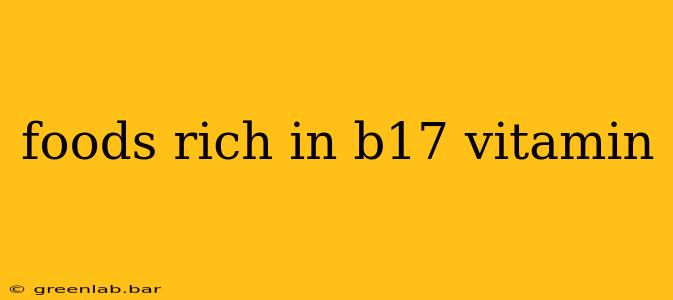The term "vitamin B17" is often used interchangeably with amygdalin, a naturally occurring compound found in the seeds of certain fruits and plants. However, it's crucial to understand that amygdalin is not recognized as a vitamin by reputable health organizations like the National Institutes of Health (NIH). While it's true that some foods contain amygdalin, the claim that it's a vitamin with significant health benefits, particularly in cancer treatment, is largely unsupported by scientific evidence. Let's explore this topic thoroughly, separating fact from fiction.
What is Amygdalin (Laetrile)?
Amygdalin, also known as laetrile, is a cyanogenic glycoside. This means it contains cyanide, a highly toxic substance. When amygdalin is ingested, it breaks down in the body, releasing benzaldehyde, glucose, and hydrogen cyanide. The release of cyanide is the primary concern, as it can be extremely dangerous in significant amounts.
Foods Containing Amygdalin
While the health claims surrounding amygdalin are controversial, several foods naturally contain this compound in varying amounts. It's important to remember that consumption of these foods should be moderate, as excessive intake of amygdalin can lead to cyanide poisoning. Symptoms of cyanide poisoning include nausea, vomiting, headache, dizziness, and in severe cases, respiratory failure.
Here are some foods known to contain amygdalin:
- Apricot Kernels: These are arguably the most well-known source of amygdalin, but they should be consumed with extreme caution due to the high concentration of cyanide.
- Apple Seeds: Apple seeds contain small amounts of amygdalin. The amount present in a few apple seeds is generally considered harmless, but consuming large quantities is not advised.
- Peach Pits: Similar to apricot kernels, peach pits contain amygdalin and should be consumed sparingly, if at all.
- Plum Pits: Plum pits also contain amygdalin, albeit in relatively small quantities compared to apricot kernels.
- Lima Beans: Although less concentrated than in seeds, lima beans also contain trace amounts of amygdalin.
- Cassava: This starchy root vegetable contains amygdalin, but processing methods often reduce the concentration.
The Controversy Surrounding Amygdalin and Cancer
Many proponents of amygdalin claim it has anti-cancer properties. However, this claim lacks significant scientific backing. Numerous studies have failed to demonstrate the effectiveness of amygdalin in treating or preventing cancer. In fact, the potential toxicity from cyanide release poses a serious health risk, outweighing any purported benefits. Always consult with your doctor before considering any alternative cancer treatments.
Responsible Consumption
While some foods naturally contain amygdalin, it’s vital to prioritize safety. Avoid consuming large quantities of foods known to be high in amygdalin. The potential risks of cyanide poisoning significantly outweigh any purported benefits.
Conclusion
While foods containing amygdalin exist, it's crucial to approach their consumption with caution. The term "vitamin B17" is misleading, and the health claims associated with amygdalin lack credible scientific support. Prioritize a balanced diet rich in proven beneficial vitamins and minerals, and always consult a healthcare professional before trying any alternative treatments. This information is for educational purposes only and is not intended as medical advice.

